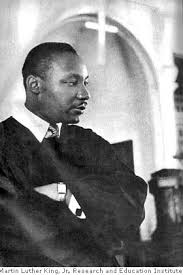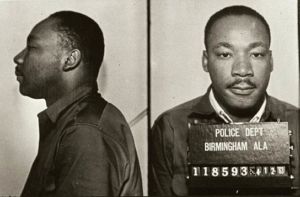The Negro Is Your Brother: The Rev. Martin Luther King Jr.’s ‘Letter from Birmingham Jail’
I have recently let my frustration with the post-civil rights era spoil my deep affection for The Reverend Martin Luther King and the celebration of MLK day. No more.
My dear friend, California school teacher Rebecca Friedrichs, who is fighting for the restoration of full First Amendment rights of all public employees, carries a copy of a letter that Rev. King wrote from the Birmingham Jail in April of 1963 with her when she travels—and keeps it near here at home. I pulled that letter up today; I am struck by King’s deep faith in humanity and wide-ranging intelligence.
I am hopping on a plane to our nation’s Capital today with a copy of that letter tucked into my briefcase.
I pray that when children return to the classroom tomorrow, or when enjoying the holiday in King’s honor today, that they could all have teachers as gifted as Mrs. Friedrichs, who understand that the “A is for Activism” and other Leftist indoctrination is a false witness, a degradation, of what Rev. King wanted for black Americans and our great nation. What would he say about the obsession with race, gender, sexual orientation—all things Identity—taking over the nation’s schools and political conversation?
Is that what he wanted for the country he loved?

Rev. King wrote this landmark letter on scraps of paper, whatever he could find in the cell, in response to critics, noting that he only had time to do so because he was stuck in jail. While regretting the reason he was in jail, we can be grateful Rev. King had time to share his great intellect and make his case from that Birmingham jail cell. The letter, originally published as “The Negro Is Your Brother,” can be read here. Here is a short excerpt to inspire you to read the rest.

You express a great deal of anxiety over our willingness to break laws. This is certainly a legitimate concern. Since we so diligently urge people to obey the Supreme Court’s decision of 1954 outlawing segregation in the public schools, it is rather strange and paradoxical to find us consciously breaking laws. One may well ask, “How can you advocate breaking some laws and obeying others?” The answer is found in the fact that there are two types of laws: there are just laws, and there are unjust laws. I would agree with St. Augustine that “An unjust law is no law at all.”
Now, what is the difference between the two? How does one determine when a law is just or unjust? A just law is a man-made code that squares with the moral law, or the law of God. An unjust law is a code that is out of harmony with the moral law. To put it in the terms of St. Thomas Aquinas, an unjust law is a human law that is not rooted in eternal and natural law. Any law that uplifts human personality is just. Any law that degrades human personality is unjust. All segregation statutes are unjust because segregation distorts the soul and damages the personality …
There are some instances when a law is just on its face and unjust in its application. For instance, I was arrested Friday on a charge of parading without a permit. Now, there is nothing wrong with an ordinance which requires a permit for a parade, but when the ordinance is used to preserve segregation and to deny citizens the First Amendment privilege of peaceful assembly and peaceful protest, then it becomes unjust.
Rest in Peace, Reverend King